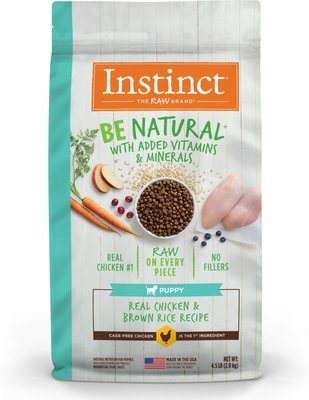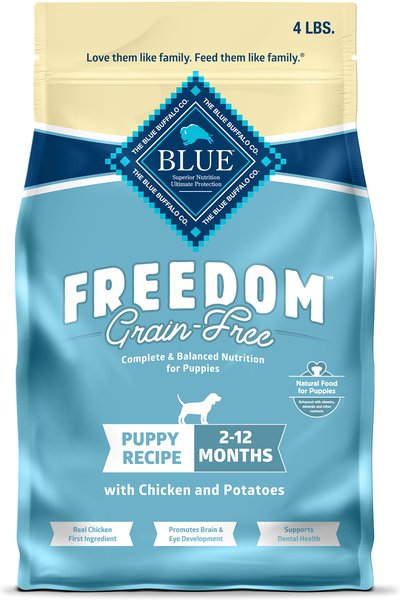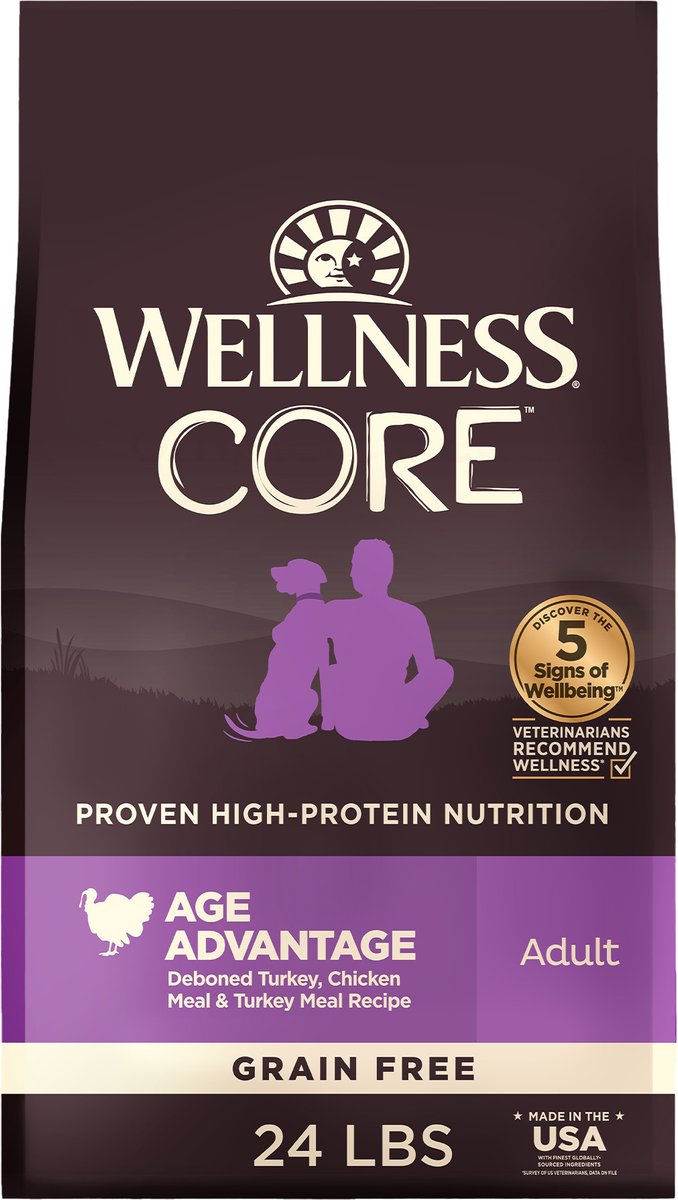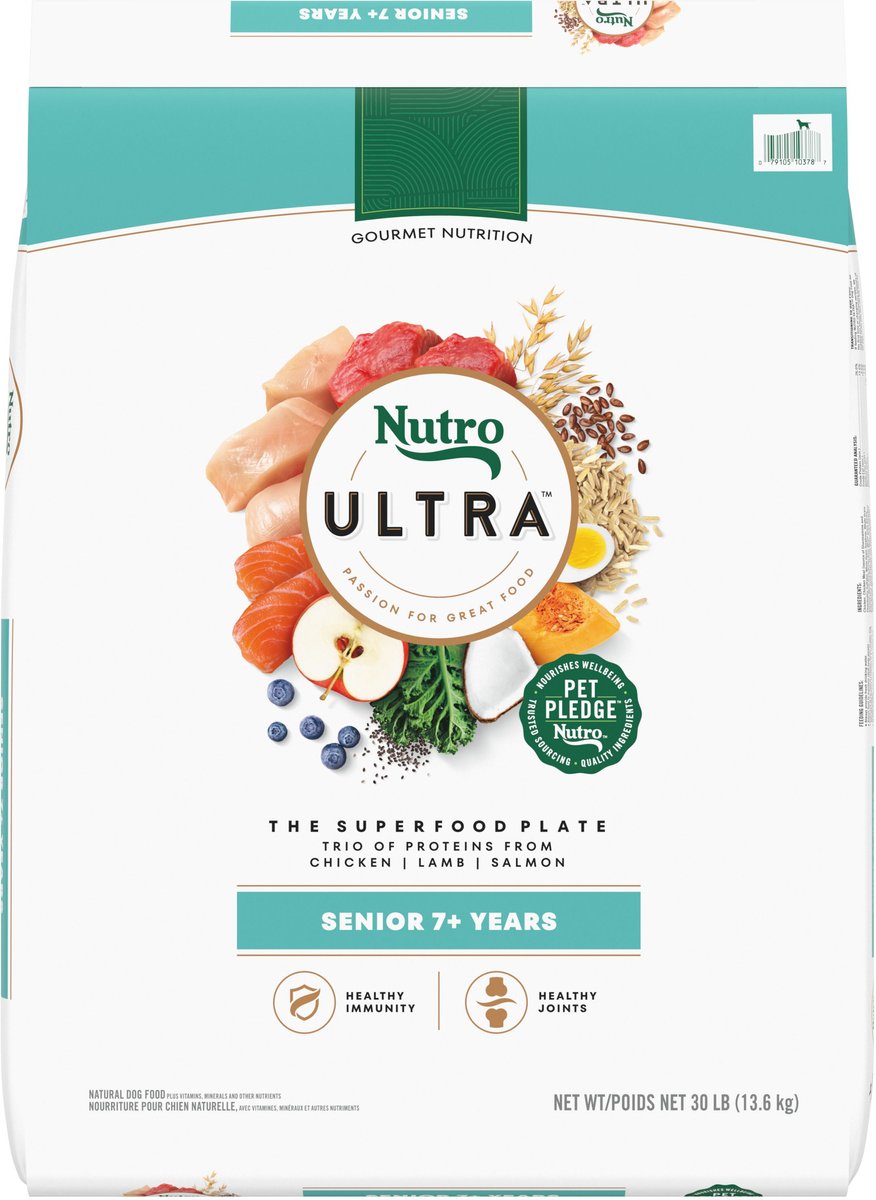What are the Best Dog Foods for Labrador Retrievers?

The friendly Labrador Retriever is an active dog, full of affection and fun. Helping this energetic pooch to maintain optimal health is of great importance to every Labrador Retriever owner. Whether you share your home with a puppy, a mature adult, or a senior, our list of top quality diets will help you select the right food to fuel your Labrador Retriever’s health and lifestyle.
Jump to section
Breed Info
Breed Group:Sporting | AKC Labrador Retriever Profile
Ideal Weight:Female Adult: 55 to 70 pounds
Male Adult: 64 to 81 pounds
Exercise Need:45 to 75 minutes per day
Breed Summary
The Labrador Retriever is sweet and affectionate by nature. Considered to be the most popular dog breed in the United States today, the Labrador Retriever is an energetic dog of exceptional intelligence. As such, the breed is renowned for having high activity needs, enjoying many different athletic pursuits with its family.
The Labrador Retriever is friendly to animals and people alike and is truly a dog that has never met a stranger. A versatile dog breed, the Labrador Retriever, often referred to affectionately as a Lab, excels at many different activities including obedience, Rally, agility, scent detection, field trials, conformation, therapy work, and much, much more.
This dog type is both loyal and devoted to its family and thrives in the company of its people. Labrador Retrievers enjoy teamwork-based activities and take great pleasure in learning new things. This makes this dog breed a treat to train.
The Labrador Retriever traces its roots to the Canadian province of Newfoundland. Its original purpose was to assist fishermen by retrieving items such as nets, ropes, and fish from the icy waters of the Atlantic Ocean. The breed’s thick double coat helps to provide protection against extremes of weather, including both heat and cold.
An excellent family companion, the Labrador Retriever is gentle and amiable, making it well-suited to life with children.
Fun fact: Though the Labrador Retriever’s name leads people to believe this dog hails from the Atlantic province of Labrador, this dog type is actually from neighboring Newfoundland. Its original name was the St. John’s Water Dog after the capital city of the province to which this breed traces its roots.
Physical Traits
Muscular, athletic, energetic, strong, sturdy
Personality Traits
Gentle, affectionate, people-oriented, intelligent, eager to please
Health Considerations
-
To select the best dog food for a Labrador Retriever, it is a good idea to begin by examining the different health conditions that can affect this popular dog breed. Though typically a dog type that enjoys excellent health and good longevity, there are a number of health problems the Labrador Retrievers can be predisposed to developing. Among those of the greatest concern are hip and elbow dysplasia, osteochondrosis dissecans, myopathy, obesity, and cataracts.
-
Hip & Elbow Dysplasia
Hip and elbow dysplasia are inherited disorders that can affect the Labrador Retrievers. Hip dysplasia occurs when the hip ball does not fit properly within the socket, causing rubbing, bone deterioration, and pain.
Recommendations:
Antioxidants・ Chondroitin・ Glucosamine・ Green Mussel・ Methylsulfonymethane・ Omega-3 from Fish Oil・ Taurine・ Turmeric・ Vitamin E -
Myopathy
Myopathy is seen in Labrador Retrievers as early as six weeks of age. The most common symptoms include fatigue and stiff movement. Dogs with this condition often show exercise intolerance and may have difficulty maintaining balance. There isn't currently treatment available, but a warm environment and supplement with the following may ease discomfort.
-
Obesity
Since the Labrador Retrievers enjoys eating, obesity can be a problem. This dog breed will eat far beyond the point of satiation if permitted to do so. To prevent a dog from becoming overweight, all food should be measured, and the dog’s daily intake carefully monitored.
Recommendations:
Large bites (to slow chewing)・ L-carnitine・ Low calorie・ Low fat -
Osteochondrosis Dissecans (OCD)
Osteochondrosis Dissecans, a condition referred to by the acronym OCD, is seen in Labrador Retrievers when cartilage does not grow properly between the elbows or shoulders. This leads to reduced mobility, inflammation, and pain. Over time, the dog may be unable to bend the elbow joint at all. To help, we like foods and supplements that promote bone and joint health.
Get a tailored nutrition profile for your dog
Our free nutritional assessment tool provides individualized recommendations based on your dog's breed characteristics, age, weight, body condition score, and activity level. It only takes 30 seconds to receive science-based insights to support your dog's lifelong health.
Are Fresh Food Diets Good for Labrador Retrievers?
Only if they’re properly balanced.
Many well-intentioned Labrador Retrievers parents spend a lot of time preparing meals at home, but health benefits are lost if meals aren’t properly portioned and balanced with all the nutrients dogs need. Recently, a few companies have done an excellent job ensuring accurate portions and nutrient balance by delivering pre-prepped fresh meals customized to the size and needs of your dog. Farmer’s Dog, Ollie and Nom Nom have each been approved by our nutrition team as delivering truly quality and well-balanced meals. They can be a little expensive (usually 3-4x more per day than kibble), but many find the added health benefits worth the cost. They do offer discounts to new customers, though, if you’d like to try one out.
Pros and Cons of Fresh Food Diets
✓ Diets balanced by Nutritionists・ ✓ Customized portions for weight control・ ✓ Superior digestive and immune health ・✕ More expensive than standard dog food
Foods We Recommend for Labrador Retrievers Puppies
How long do Labrador Retrieverss need puppy food?
Until they're 12 to 16 months old.
Labrador Retrievers are very focused on growing, and how we feed them should help them do just that. Since they have so much growing to do, they need higher amounts of nutrients than adult dogs, especially proteins, fats, carbohydrates, vitamins, minerals and — don’t forget — water. It’s still important to not overfeed puppies, so make sure to portion food and keep treats to no more than 10% of their caloric intake. Since balance is so important, we recommend that your young Labrador Retrievers is eating food that is made just for puppies from a reputable brand.
Find the best nutritional start for your puppy
Our recommendation tool evaluates your puppy’s breed, age, growth stage, lifestyle, and health needs to identify a scientifically appropriate diet from over 10,000 options. Obtain personalized guidance to help support healthy development and lifelong wellness.
Foods We Recommend for Labrador Retrievers Adults
When should Labrador Retrievers start transitioning to adult food?
When they're 12 to 16 months old
From a nutrition standpoint, Labrador Retrievers become adults once they reach about 90% of their expected weight. Once adults, our two key nutrition goals are balance and maintenance. We want balance because a dog’s body is responsible for a lot of things, like digestion, fighting infection, keeping muscles strong, and chasing squirrels. These are all important tasks, so we want to make sure each body function gets its share of nutrients. We also need to maintain a healthy weight. Underfed dogs are at risk for malnourishment, and overfed dogs can become obese — both of which lead to even worse problems for a Labrador Retriever
Find the optimal nutrition plan for your adult dog
Our assessment analyzes your dog’s breed, age, lifestyle, and health considerations to recommend a scientifically selected diet from over 10,000 options. Personalized insights to help your dog thrive through adulthood.
Foods We Recommend for Labrador Retrievers Seniors
When should Labrador Retrievers start transitioning to senior food?
All dogs can age differently, but large dogs like Labrador Retrievers can start to benefit from senior food around 6 to 8 years old
Ever watch kids running around the playground and wish you had that energy again? Yeah. Dogs get there, too. The metabolic processes in senior Labrador Retrievers slow down as they age, which often means they aren’t needing quite as many calories as they did in their prime. Smart dog food companies have formulated senior diets to ease up on calories but still help them feel full and give them adequate maintenance protein. Still, like humans, everybody is different. Sometimes older dogs need just as many calories, or more, depending on how their bodies progress. So keep a close eye on their body condition, and look for dog foods made for seniors.
Support your senior dog's health with targeted nutrition
Our assessment analyzes your dog’s breed, age, and health considerations to recommend a science-based diet from over 10,000 options. Help maintain mobility, cognitive health, and quality of life.
Affiliate Disclosure:
We do not accept money to recommend pet foods. However, we do receive referral fees from online retailers (such as Chewy or Amazon) on qualifying purchases. Our recommendations are neutral, and diet recommendations are made without considering whether we will receive a referral fee.















